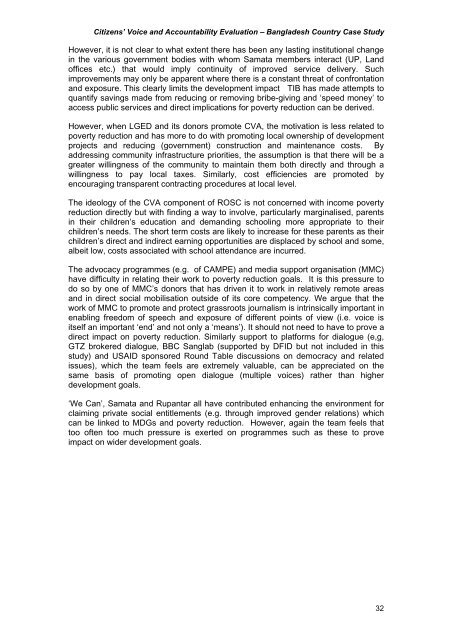Bangladesh - Belgium
Bangladesh - Belgium
Bangladesh - Belgium
Create successful ePaper yourself
Turn your PDF publications into a flip-book with our unique Google optimized e-Paper software.
Citizens’ Voice and Accountability Evaluation – <strong>Bangladesh</strong> Country Case Study<br />
However, it is not clear to what extent there has been any lasting institutional change<br />
in the various government bodies with whom Samata members interact (UP, Land<br />
offices etc.) that would imply continuity of improved service delivery. Such<br />
improvements may only be apparent where there is a constant threat of confrontation<br />
and exposure. This clearly limits the development impact TIB has made attempts to<br />
quantify savings made from reducing or removing bribe-giving and ‘speed money’ to<br />
access public services and direct implications for poverty reduction can be derived.<br />
However, when LGED and its donors promote CVA, the motivation is less related to<br />
poverty reduction and has more to do with promoting local ownership of development<br />
projects and reducing (government) construction and maintenance costs. By<br />
addressing community infrastructure priorities, the assumption is that there will be a<br />
greater willingness of the community to maintain them both directly and through a<br />
willingness to pay local taxes. Similarly, cost efficiencies are promoted by<br />
encouraging transparent contracting procedures at local level.<br />
The ideology of the CVA component of ROSC is not concerned with income poverty<br />
reduction directly but with finding a way to involve, particularly marginalised, parents<br />
in their children’s education and demanding schooling more appropriate to their<br />
children’s needs. The short term costs are likely to increase for these parents as their<br />
children’s direct and indirect earning opportunities are displaced by school and some,<br />
albeit low, costs associated with school attendance are incurred.<br />
The advocacy programmes (e.g. of CAMPE) and media support organisation (MMC)<br />
have difficulty in relating their work to poverty reduction goals. It is this pressure to<br />
do so by one of MMC’s donors that has driven it to work in relatively remote areas<br />
and in direct social mobilisation outside of its core competency. We argue that the<br />
work of MMC to promote and protect grassroots journalism is intrinsically important in<br />
enabling freedom of speech and exposure of different points of view (i.e. voice is<br />
itself an important ‘end’ and not only a ‘means’). It should not need to have to prove a<br />
direct impact on poverty reduction. Similarly support to platforms for dialogue (e,g,<br />
GTZ brokered dialogue, BBC Sanglab (supported by DFID but not included in this<br />
study) and USAID sponsored Round Table discussions on democracy and related<br />
issues), which the team feels are extremely valuable, can be appreciated on the<br />
same basis of promoting open dialogue (multiple voices) rather than higher<br />
development goals.<br />
‘We Can’, Samata and Rupantar all have contributed enhancing the environment for<br />
claiming private social entitlements (e.g. through improved gender relations) which<br />
can be linked to MDGs and poverty reduction. However, again the team feels that<br />
too often too much pressure is exerted on programmes such as these to prove<br />
impact on wider development goals.<br />
32

















